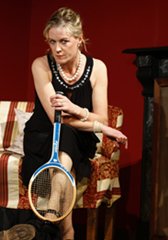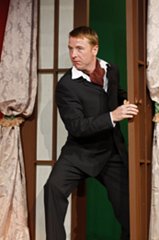In his famous parody of the cut-throat West End theatre scene, the brief and brilliant The Real Inspector Hound, Tom Stoppard describes London’s theatre critics with little affection. Pompous, verbose, envious, long-winded, living vicariously and obsessed with their own self-importance and pride in seeing things that are simply not there, the critics’ ability to make or break a play, director or actor endows them with far too much power. Fortunately, Dingle’s long-established Beehive Theatre Company is not often subject to such critical attack, defending an enviably promininant position on Corca Dhuibhne as the only theatre company for an isthmus or two producing a workmanlike sell-out run all summer-long.
 On the front row of the stalls, two critics wait for the start of a popular ‘who-dunnit’ (a blatant poke at Agatha Christie’s long-running The Mousetrap). Paranoid about each other’s opinion of the play, competing for column inches with other critics, enamoured of the leading ladies and beset by their own personal problems, their world and the theatrical intrigue in front of them intertwine. The genre’s improbable twists, appalling stereotyping and ludicrously contrived theatrical devices are repeated, magnified and mocked but nothing is what it seems and both critics become more involved in the play than they would ever have imagined. Finally, the action on stage becomes inseparable from the narrative in the stalls, and any theatrical ‘fourth-wall’, conventions or traditions are thoroughly trounced.
On the front row of the stalls, two critics wait for the start of a popular ‘who-dunnit’ (a blatant poke at Agatha Christie’s long-running The Mousetrap). Paranoid about each other’s opinion of the play, competing for column inches with other critics, enamoured of the leading ladies and beset by their own personal problems, their world and the theatrical intrigue in front of them intertwine. The genre’s improbable twists, appalling stereotyping and ludicrously contrived theatrical devices are repeated, magnified and mocked but nothing is what it seems and both critics become more involved in the play than they would ever have imagined. Finally, the action on stage becomes inseparable from the narrative in the stalls, and any theatrical ‘fourth-wall’, conventions or traditions are thoroughly trounced.
Stoppard’s knowingly clever script may touch upon weighty matters such as the nature of reality and fate, but Beehive focus on the work’s farcical elements. In fact, director Wendola Rosenberg Polak has chosen this play wisely for a cast and crew of differing experience: there is little subtlety required here in the portrayal of caricature and therefore no harm in a bit of heavy hamming. The most accomplished is Malcolm George as  Birdboot, with his sharp comic timing working well with the young Fionn O’Neill as his critic-at-arms, Moon. Trish Howley does well as charlady/ busy-body drudge and Slaine Ní Chathalláin is a suitably irritating simpering love-interest.
Birdboot, with his sharp comic timing working well with the young Fionn O’Neill as his critic-at-arms, Moon. Trish Howley does well as charlady/ busy-body drudge and Slaine Ní Chathalláin is a suitably irritating simpering love-interest.
Overall, this pragmatic production is brash, effusive and self-conscious: some of the very performance qualities that Stoppard sought to put in the limelight. Likewise, if designer Malcolm George’s perfectly distressed set creaks a bit, if the audience's fight for a seat necessitates sharing, and if the indefatigable Polak lengthily and loudly castigates the house about their mobile phones, for sitting on the stage and for nipping out to the toilet just before curtain up, then this too fits a piece about the vagaries of the theatre. Irony piles upon irony as the Beehive Theatre Company itself eventually becomes part of the subject matter of the evening and thus a new play about a play within a play evolves. Stoppard might have liked this.
Well-paced, aware of its audience and, above all, demonstrating an astute use of available resources, this solid and functioning production packs the Beehive Theatre at the Cúilín weekly and will continue to tempt critics, of various qualities, away from Dingle’s other considerable summery attractions.
Matthew Harrison